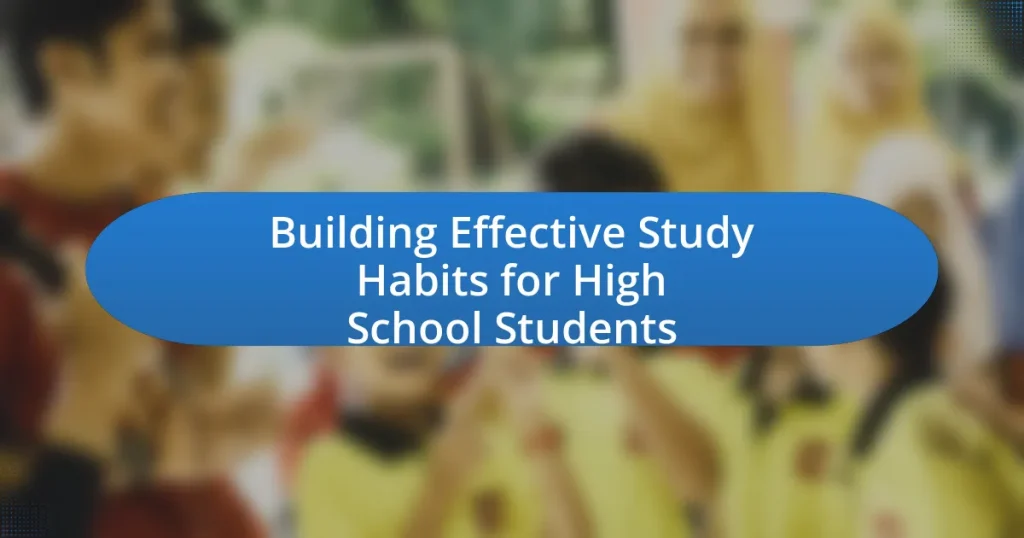The article focuses on building effective study habits for high school students, emphasizing the importance of structured study schedules, active learning techniques, and distraction-free environments. It discusses how these habits significantly impact academic performance, retention of information, and college readiness. Key strategies include time management, the use of study aids, and creating conducive study environments, while also addressing common mistakes such as procrastination and ineffective techniques. The article highlights the long-term benefits of developing strong study habits, including improved critical thinking skills and self-discipline.

What are Effective Study Habits for High School Students?
Effective study habits for high school students include creating a structured study schedule, utilizing active learning techniques, and maintaining a distraction-free environment. A structured study schedule helps students allocate specific times for studying, which can improve time management and reduce procrastination. Active learning techniques, such as summarizing information, teaching concepts to peers, and practicing retrieval through quizzes, enhance understanding and retention of material. Additionally, a distraction-free environment minimizes interruptions, allowing students to focus better on their studies. Research indicates that students who implement these habits tend to achieve higher academic performance, as evidenced by studies showing that structured study routines and active engagement with material lead to improved learning outcomes.
How do study habits impact academic performance?
Study habits significantly impact academic performance by influencing the retention of information and the ability to apply knowledge effectively. Consistent study routines, such as regular review sessions and active engagement with the material, enhance understanding and memory retention. Research indicates that students who employ effective study strategies, like spaced repetition and self-testing, achieve higher grades compared to those who do not. For instance, a study published in the journal “Psychological Science” by Dunlosky et al. (2013) found that techniques like practice testing and distributed practice are among the most effective for improving learning outcomes. This evidence underscores the critical role that well-structured study habits play in enhancing academic success.
What specific study habits lead to better grades?
Consistent study habits such as regular review sessions, active engagement with the material, and effective time management lead to better grades. Research indicates that students who space their study sessions over time, rather than cramming, retain information more effectively, as shown in a study by Cepeda et al. (2006) published in Psychological Science. Additionally, techniques like summarization, self-testing, and teaching others enhance understanding and recall, further supported by findings from Dunlosky et al. (2013) in the journal Perspectives on Psychological Science. These habits create a structured learning environment that promotes academic success.
How do study habits influence retention of information?
Study habits significantly influence the retention of information by enhancing understanding and recall. Effective study techniques, such as spaced repetition and active engagement, have been shown to improve memory retention. For instance, research published in the journal “Psychological Science” by Cepeda et al. (2006) indicates that spaced learning can lead to better long-term retention compared to cramming. Additionally, active learning strategies, such as summarizing information or teaching it to others, have been found to reinforce memory pathways, making it easier to retrieve information later. Thus, the implementation of structured and varied study habits directly correlates with improved retention of learned material.
Why is it important for high school students to develop study habits?
Developing study habits is crucial for high school students because these habits enhance academic performance and foster lifelong learning skills. Effective study habits enable students to manage their time efficiently, leading to better retention of information and improved grades. Research indicates that students who employ structured study techniques, such as spaced repetition and active recall, achieve higher academic success compared to those who do not. For instance, a study published in the journal “Psychological Science” by Cepeda et al. (2006) found that spaced learning significantly improves long-term retention of material. Thus, cultivating strong study habits not only supports immediate educational goals but also prepares students for future academic and professional challenges.
What long-term benefits do effective study habits provide?
Effective study habits provide long-term benefits such as improved academic performance, enhanced critical thinking skills, and increased self-discipline. Research indicates that students who develop effective study habits tend to achieve higher grades and retain information better over time, leading to greater academic success. For instance, a study published in the Journal of Educational Psychology found that students who employed structured study techniques scored significantly higher on assessments compared to those who did not. Additionally, these habits foster critical thinking by encouraging students to analyze and synthesize information, which is essential for problem-solving in real-world scenarios. Furthermore, consistent study routines cultivate self-discipline, a skill that translates into various aspects of life, including career and personal development.
How can study habits affect college readiness?
Study habits significantly influence college readiness by shaping a student’s ability to manage time, comprehend material, and retain information. Effective study habits, such as regular review sessions and active engagement with the material, enhance understanding and retention, which are critical for success in college-level coursework. Research indicates that students who develop strong study skills in high school are more likely to perform well academically in college, as they are better equipped to handle the increased workload and complexity of college studies. For instance, a study published in the Journal of Educational Psychology found that students who employed effective study strategies had higher GPAs and were more likely to persist in their college education.
What challenges do high school students face in developing study habits?
High school students face several challenges in developing effective study habits, including time management, distractions, and lack of motivation. Time management is critical, as students often juggle multiple subjects, extracurricular activities, and social commitments, making it difficult to allocate sufficient time for studying. Distractions from technology, such as smartphones and social media, further hinder their ability to focus on academic tasks. Additionally, many students struggle with intrinsic motivation, which can lead to procrastination and ineffective study practices. Research indicates that these factors significantly impact academic performance, highlighting the need for targeted strategies to help students cultivate better study habits.
How do distractions impact study effectiveness?
Distractions significantly reduce study effectiveness by impairing focus and retention of information. Research indicates that multitasking, often a result of distractions, can lead to a decrease in academic performance; for instance, a study published in the journal “Computers & Education” found that students who frequently used their phones while studying scored lower on tests compared to those who minimized distractions. This decline in performance is attributed to the cognitive load imposed by switching attention between tasks, which can hinder the ability to process and remember information effectively.
What role does time management play in study habits?
Time management is crucial in developing effective study habits as it enables students to allocate specific time slots for studying, thereby enhancing focus and productivity. By organizing their study schedules, students can prioritize tasks, reduce procrastination, and ensure that they cover all necessary material before exams. Research indicates that students who practice effective time management achieve higher academic performance, as they are better equipped to balance their academic responsibilities with extracurricular activities. For instance, a study published in the Journal of Educational Psychology found that students who utilized time management techniques reported lower stress levels and improved grades, demonstrating the significant impact of structured time allocation on academic success.

How Can High School Students Build Effective Study Habits?
High school students can build effective study habits by establishing a consistent study schedule, creating a conducive study environment, and utilizing active learning techniques. A consistent study schedule helps students allocate specific times for studying, which can enhance focus and retention. Research indicates that students who study regularly, rather than cramming, perform better academically (Pashler et al., 2007, Psychological Science in the Public Interest).
Creating a conducive study environment involves minimizing distractions and organizing study materials, which can improve concentration and efficiency. Additionally, employing active learning techniques, such as summarizing information, teaching concepts to peers, or using flashcards, has been shown to enhance understanding and memory retention (Roediger & Butler, 2011, Perspectives on Psychological Science). These strategies collectively contribute to the development of effective study habits among high school students.
What strategies can students use to improve their study habits?
Students can improve their study habits by implementing structured time management techniques, such as the Pomodoro Technique, which involves studying for 25 minutes followed by a 5-minute break. This method enhances focus and retention, as supported by research from the University of Illinois, which found that short breaks can significantly boost cognitive performance. Additionally, students should create a dedicated study environment free from distractions, as a study by the Journal of Educational Psychology indicates that a conducive environment can lead to improved concentration and productivity. Regularly reviewing material through active recall and spaced repetition further solidifies knowledge retention, a strategy backed by cognitive science research showing its effectiveness in long-term memory formation.
How can creating a study schedule enhance productivity?
Creating a study schedule enhances productivity by providing structure and prioritization to study sessions. A well-organized schedule allows students to allocate specific time blocks for different subjects or tasks, reducing procrastination and increasing focus. Research indicates that students who use study schedules report higher academic performance, as they can manage their time effectively and balance study with other responsibilities. For instance, a study published in the Journal of Educational Psychology found that students who adhered to a structured study plan improved their grades by an average of 20%. This demonstrates that a study schedule not only helps in organizing study time but also significantly boosts overall academic success.
What techniques can be used for active learning?
Techniques for active learning include collaborative learning, problem-based learning, and self-explanation. Collaborative learning involves students working together to solve problems or complete tasks, which enhances understanding through peer interaction. Problem-based learning requires students to engage with real-world problems, promoting critical thinking and application of knowledge. Self-explanation encourages students to articulate their understanding and reasoning, reinforcing their learning process. Research shows that these techniques significantly improve retention and comprehension, making them effective strategies for high school students.
How can students create a conducive study environment?
Students can create a conducive study environment by organizing their study space, minimizing distractions, and ensuring proper lighting and comfort. An organized study space allows students to locate materials easily, which enhances focus and efficiency. Research indicates that clutter can negatively impact concentration, making it essential to keep the area tidy. Minimizing distractions, such as turning off notifications on electronic devices, helps maintain attention on study tasks. Additionally, proper lighting reduces eye strain and fatigue, contributing to longer and more effective study sessions. A comfortable chair and desk setup further supports sustained focus, as physical discomfort can lead to decreased productivity.
What elements are essential for an effective study space?
An effective study space requires proper lighting, minimal distractions, comfortable seating, and organized materials. Proper lighting, such as natural light or adjustable lamps, enhances focus and reduces eye strain, which is crucial for prolonged study sessions. Minimal distractions, including a quiet environment and limited electronic devices, help maintain concentration. Comfortable seating supports good posture, allowing students to study for longer periods without discomfort. Organized materials, such as notebooks, textbooks, and stationery, facilitate efficient study habits by making resources easily accessible. Research indicates that a well-structured study environment significantly improves academic performance and retention of information.
How does organization contribute to better study habits?
Organization significantly contributes to better study habits by providing structure and clarity to the learning process. When students organize their study materials, schedules, and goals, they can prioritize tasks effectively, reducing procrastination and enhancing focus. Research indicates that students who maintain organized study environments tend to perform better academically, as they can easily locate resources and manage their time efficiently. For instance, a study published in the Journal of Educational Psychology found that students with organized study habits reported higher levels of academic achievement and lower levels of stress. This correlation underscores the importance of organization in fostering effective study practices among high school students.
What role do resources and tools play in developing study habits?
Resources and tools are essential in developing study habits as they provide structure, enhance understanding, and facilitate effective learning strategies. For instance, study guides, flashcards, and educational apps help students organize information and reinforce concepts, leading to improved retention. Research indicates that students who utilize structured resources, such as planners and digital tools, exhibit better time management and focus, which are critical components of effective study habits. A study by the National Center for Education Statistics found that students who engage with educational technology show higher academic performance, demonstrating the positive impact of resources and tools on study habits.
Which study aids are most effective for high school students?
The most effective study aids for high school students include flashcards, practice tests, and summarization techniques. Flashcards enhance memory retention through active recall, while practice tests improve understanding and application of knowledge, as evidenced by research from the University of California, which found that retrieval practice significantly boosts long-term retention. Summarization techniques help students distill information, making it easier to grasp complex concepts. These aids are supported by educational studies that highlight their effectiveness in improving academic performance among high school students.
How can technology be leveraged to enhance study habits?
Technology can be leveraged to enhance study habits by utilizing digital tools and resources that promote organization, engagement, and personalized learning. For instance, applications like Todoist and Trello help students manage their tasks and deadlines effectively, leading to improved time management skills. Research indicates that students who use digital planners report higher levels of productivity and lower stress levels (American Psychological Association, 2020). Additionally, educational platforms such as Khan Academy and Quizlet provide interactive learning experiences that cater to various learning styles, enhancing retention and understanding of material. Studies show that interactive learning tools can increase student engagement by up to 50% (National Education Association, 2019). By integrating these technologies into their study routines, students can develop more effective and efficient study habits.

What are Common Mistakes High School Students Make in Their Study Habits?
High school students commonly make mistakes in their study habits, including procrastination, ineffective time management, and lack of active engagement with the material. Procrastination leads to last-minute cramming, which is less effective for long-term retention of information. Ineffective time management often results in students underestimating the time needed for assignments, leading to rushed work and poor quality. Additionally, many students fail to actively engage with the material, such as through summarization or self-testing, which research shows enhances understanding and retention. A study by Dunlosky et al. (2013) in “Psychological Science in the Public Interest” highlights that techniques like self-testing and distributed practice significantly improve learning outcomes, underscoring the importance of effective study strategies.
What pitfalls should students avoid when studying?
Students should avoid procrastination when studying, as it leads to increased stress and lower quality of work. Research indicates that procrastination can negatively impact academic performance, with studies showing that students who procrastinate tend to have lower grades and higher anxiety levels. Additionally, students should steer clear of multitasking, which can reduce focus and retention of information; studies have demonstrated that multitasking can decrease productivity by as much as 40%. Lastly, students should not neglect proper time management, as poor planning can result in cramming, which is less effective for long-term retention compared to spaced repetition.
How can procrastination hinder effective studying?
Procrastination significantly hinders effective studying by reducing the time available for learning and increasing stress levels. When students delay their study sessions, they often find themselves cramming information at the last minute, which leads to superficial understanding rather than deep learning. Research indicates that cramming can result in a retention rate of only 10-30% of the material studied, compared to a 70-90% retention rate achieved through spaced repetition and consistent study habits. Additionally, procrastination can create a cycle of anxiety and guilt, further impairing cognitive function and focus, as noted in studies published in the Journal of Educational Psychology. This combination of reduced study time and increased anxiety ultimately undermines academic performance.
What are the consequences of ineffective study techniques?
Ineffective study techniques lead to poor academic performance and decreased retention of information. Students employing these techniques often experience lower grades, which can result in diminished self-esteem and motivation. Research indicates that students using ineffective methods, such as cramming or passive reading, retain only about 10-20% of the material after a week, compared to 70-80% retention achieved through active learning strategies like spaced repetition and self-testing. Consequently, the long-term impact includes a lack of preparedness for advanced coursework and standardized tests, ultimately affecting college admissions and career opportunities.
How can students identify and correct poor study habits?
Students can identify and correct poor study habits by self-assessing their study routines and outcomes. They should track their study times, evaluate their understanding of the material, and reflect on their grades to pinpoint ineffective strategies. Research indicates that students who maintain a study log can recognize patterns in their performance, allowing them to adjust their methods accordingly. For example, if a student notices that cramming before exams leads to lower retention, they can shift to spaced repetition techniques, which are proven to enhance long-term memory retention. By actively monitoring their habits and outcomes, students can implement targeted changes to improve their study effectiveness.
What self-assessment methods can help students evaluate their study habits?
Self-assessment methods that can help students evaluate their study habits include reflective journals, self-questionnaires, and time-tracking tools. Reflective journals allow students to document their study experiences, identify what strategies worked or did not work, and reflect on their learning processes. Self-questionnaires, such as the Learning and Study Strategies Inventory (LASSI), provide structured feedback on various aspects of study habits, including motivation and time management. Time-tracking tools enable students to monitor how much time they spend on different subjects and tasks, helping them identify areas needing improvement. These methods are effective as they encourage active engagement in the learning process and provide insights into personal study behaviors.
How can feedback from teachers and peers improve study practices?
Feedback from teachers and peers can significantly enhance study practices by providing targeted insights and constructive criticism. Teachers can identify specific areas where a student may struggle, allowing for tailored study strategies that address those weaknesses. For instance, a study published in the “Journal of Educational Psychology” by Hattie and Timperley (2007) found that feedback that is specific, timely, and actionable leads to improved student performance. Peer feedback fosters collaborative learning, encouraging students to engage with different perspectives and approaches, which can lead to a deeper understanding of the material. Research indicates that students who participate in peer review processes show greater retention of information and improved critical thinking skills, as highlighted in a study by Topping (1998) in “Educational Psychology.” Thus, both teacher and peer feedback create a supportive learning environment that promotes effective study habits.
What are some practical tips for maintaining effective study habits?
To maintain effective study habits, students should establish a consistent study schedule. This involves setting specific times each day dedicated to studying, which helps create a routine and reinforces discipline. Research indicates that regular study sessions improve retention and understanding of material, as highlighted in a study by Cepeda et al. (2006) published in “Psychological Science,” which found that spaced repetition enhances long-term memory retention. Additionally, students should create a distraction-free study environment, as a quiet and organized space can significantly improve focus and productivity. Implementing active learning techniques, such as summarizing information or teaching concepts to others, further enhances comprehension and retention. Lastly, taking regular breaks during study sessions, as supported by the Pomodoro Technique, can prevent burnout and maintain motivation.
How can students stay motivated to stick to their study plans?
Students can stay motivated to stick to their study plans by setting specific, achievable goals and tracking their progress. Research indicates that goal-setting enhances motivation and performance; for instance, a study published in the Journal of Educational Psychology found that students who set specific goals achieved higher academic outcomes compared to those who did not. Additionally, incorporating rewards for reaching milestones can reinforce positive behavior and maintain motivation. Regularly reviewing and adjusting study plans based on progress also helps students stay engaged and committed to their academic objectives.
What are the best practices for reviewing material effectively?
The best practices for reviewing material effectively include active recall, spaced repetition, and summarization. Active recall involves testing oneself on the material rather than passively reading, which enhances memory retention. Spaced repetition, a technique supported by cognitive science, suggests reviewing material at increasing intervals to combat forgetting. Summarization helps in distilling key concepts, making it easier to grasp and remember the information. Research indicates that these methods significantly improve learning outcomes, as evidenced by studies showing that students who employ active recall and spaced repetition score higher on assessments compared to those who do not.


